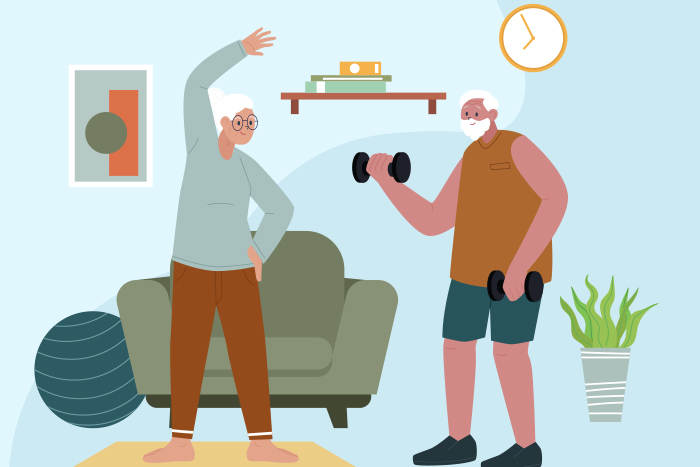Staying Strong During Treatment for Cancer
Cancer treatment can be tough. Whether you're just starting or already in the middle of treatment, it’s normal to feel tired, uncertain, or overwhelmed. The good news is there are small, simple things you can do every day to help your body and mind stay strong.
This article shares gentle, encouraging tips to help you feel your best during this time. You’re not alone—and with a little care and support, you can get through this with strength and grace.
Eat to Stay Strong
Food is fuel for your body, especially during cancer treatment. Treatments like chemotherapy, radiation, or surgery can affect your appetite, taste, or digestion. You may not feel like eating much, but your body still needs good nutrition to stay strong and heal.
Here are some simple tips:
Eat small meals more often. If large meals feel like too much, try eating five or six small meals throughout the day.
Include protein. Foods like eggs, chicken, yogurt, peanut butter, and beans help repair body tissues and keep your muscles strong.
Drink plenty of water. Staying hydrated can help with energy and prevent side effects like dry mouth or constipation.
Try snacks that are gentle on your stomach. Crackers, toast, applesauce, or smoothies may be easier to eat on days when your stomach feels off.
If you’re having trouble eating or keeping food down, tell your doctor. A dietitian can help create a plan just for you.
Keep Moving
You don’t have to run a marathon. Just a short walk or a few light stretches can do wonders for your mood, energy, and sleep. Physical activity also helps reduce treatment side effects like fatigue and stiffness.
Start slow. Even 5–10 minutes of movement a day makes a difference.
Take walks. Walking around your home, yard, or neighborhood (if you’re able) is a great way to stay active.
Try chair exercises. If balance is a concern, gentle moves while seated can still help.
Listen to your body. Rest when you need it. It’s okay to skip a day and come back when you’re ready.
Before starting any new movement routine, ask your doctor what’s safe for you.
Get the Rest You Need
Cancer treatment takes a lot of energy, and feeling tired is very common. That’s your body telling you it needs rest to heal.
Take short naps if needed. A 20–30 minute nap can help recharge you without throwing off your sleep at night.
Stick to a routine. Going to bed and waking up at the same time each day can help your body sleep better.
Create a calming bedtime routine. A warm bath, soft music, or reading a book can help you wind down.
Talk to your doctor if you’re having trouble sleeping. There may be medication or relaxation techniques that can help.
Don’t Forget Your Emotions
Your mind needs care, too. It’s natural to feel sad, anxious, or even angry at times during treatment. Try not to bottle it up. Talking about how you feel is part of healing.
Here’s what may help:
Share your feelings. Talk with family, friends, or a counselor.
Join a support group. Many people find comfort in talking with others who are going through the same thing.
Write in a journal. Putting your thoughts on paper can help release stress.
Do something you enjoy. Whether it’s listening to music, gardening, or watching a favorite show, doing something that brings you joy matters.
It’s okay to ask for help—emotional support is just as important as physical care.
Accept Help from Others
Many people want to help you during this time—let them. Whether it’s running errands, preparing meals, or just sitting with you for company, accepting help can make a big difference.
Make a list of tasks others can help with.
Ask someone to coordinate meals or rides if needed.
Say yes to offers of help, even if they feel small. Letting others support you also helps them feel useful.
Remember, you don’t have to do it all alone. Depending on your age, overall health, and the stage and type of your cancer, long-term care insurance may help ease physical and financial stress by covering services like in-home care or help with daily activities.*
Keep in Touch With Your Doctor
During treatment, check in with your doctor and cancer care team regularly. Report any side effects or new symptoms. Don’t wait—your care team wants to help you feel as good as possible.
You can also ask about:
Nutritional support
Physical therapy
Managing pain or side effects
Emotional support resources
Write down your questions between appointments so you don’t forget.
You’re Stronger Than You Think
Cancer treatment isn’t easy, but each day you get through is a step forward. By caring for your body, staying connected to others, and leaning on your care team, you are building strength from the inside out.
Take things one day at a time—and be gentle with yourself. You’re doing something hard, and you’re doing it with courage.
Sources:
National Cancer Institute: Coping with Cancer
National Cancer Institute: Daily Routine
Mayo Clinic: Cancer
*Disclaimer: Healthcare Select may earn a commission if you purchase a product or service through links to our partners. This comes at no extra cost to you.

